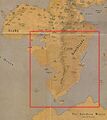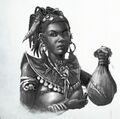Southlands
Southlands is the name for the not!Africa region of two different settings; the Warhammer Fantasy world and the Midgard setting for Dungeons & Dragons.
Warhammer Southlands[edit]

The Southlands are the Warhammer World's analogue to Sub-Saharan Africa. Meanwhile the northern half of Africa is covered by Araby and Nehekhara, while the area vaguely corresponding to the Arabian Peninsula and Middle East are the Badlands. It's often stated that it's not a part of the Old World, which in the Warhammer universe is mostly just Europe.
Most of it is jungles and swamps filled to the brim with lizardmen and dinosaurs... so, just a copy of Lustria. The lore explains this by saying that in the ancient past, the Southlands and Lustria were joined together (just like Africa and South America were in real life). The Old Ones sundered the continents and created the Great Ocean to make conditions more favorable for the younger races.
Factions of the Southlands[edit]
Besides the lizards, there is an abandoned dwarf fortress, Karak Zorn, which is rumored to be the oldest dwarf stronghold ever, and The Fortress of Dawn, an outpost established by the Ulthuani Elves.
There's also an ape-like breed of Beastmen called Apemen, and the Skaven- Clan Pestilens has their capital here, and they were accompanied by Clan Festerlingus, who resided in the Mangrove Coast before Clan Moulder ordered Deathmaster Snikch to see to the destruction of Clan Festerlingus for butting in on the Warbeast market with their Ratigator experiments.
Baseless fan speculation is that the Patron God of the Apemen is the Minor Chaos God Phraz-Etar, as a reference to the "Frazetta Man" trope, started when Frank Frazetta, Phraz-Etar's namesake, used to do illustrations of Ape monsters for Conan the Barbarian comics.
The Apemen are mentioned as occasionally going north into the savannahs surrounding the southernmost city of Araby, Ka-Sabar, to make raids.
Mentions of Forest Goblins and Savage Orcs living in the jungles are also made, so Greenskins have staked a claim in the jungle as well.
Native Southlanders[edit]
It's stated that there actually are dark-skinned humans living here as well (NOT the Pygmies, those PR nightmares live in Lustria).
The Southlanders who live along the border of Araby were influenced by Arabyan culture, and they also intermarried with Arabyans. Aside from these, much of their cultures were unknown, but presumably primitive due to their isolation. It could be extrapolated that the Apemen of The Southlands are the result of random births (as well as their own breeding) from amongst the villages of the Southlands, much the same as expecting mothers in the Empire have to fear giving birth to Gors and Ungors.
Considering that they lived near the Lizardmen, perhaps they would had built their own cultures and kingdoms too. Alas, as with Araby, GW was more focused on the more popular factions, so this was left to the realm of homebrew. (Example)
It could be possible that the darker-skinned characters in Age of Sigmar might be descendants of surviving Southlanders who were revived along with the other humans in the Mortal Realms.
Notable Southlander characters[edit]
Fortunately, the writers at Games Workshop had not forgotten about the native Southlanders, so they made several notable characters among this mostly-unknown people:
- Keiti Ouala - In WFRP 4e: Enemy in Shadows Companion, she is mentioned as a merchant from the Southlands who trades jewellery, furs from local wildlife, rare spices and metals, and coffee. Keiti Ouala is also an eloquent speaker, and she likes gambling and drinking.
- Unnamed mute slave - He was mentioned as a slave who worked for the Imperial actress from Marienburg, Lilli Nissen, in the novel Drachenfels. After she was replaced by another actress after she was traumatised by the eyeless face of the bounty hunter Anton Veidt, his further fate is unknown, whether Lilli still kept him or he was released.
- Queen Nitocris of the Southlands - a vampire who used to live in the swamplands in the northeast, mentioned in the novel The Serpent Queen. She used to rule her own tribe and fend off raids from an Indish army, avenging her mother's death by killing the Khornate warriors who murdered her. Neferata turned her into a vampire and used her in the former's wars against her rival Khalida. She was slain by Gotrek Gurnisson. She may be a reference to Queen of Sheba, who is believed to come from Ethiopia, and is featured in many works from the Victorian Era about Africa, including King Solomon's Mines.
Gallery[edit]
-
The Southlands proper.
-
A more detailed map of the Southlands.
-
Native Southlanders.
-
A Southlander character from the 4th Edition, Keiti Ouala, a merchant.
-
Stats for Keiti Ouala.
| Regions and Areas of the Warhammer World | |
|---|---|
| Areas of The Old World: | The Empire of Man - Bretonnia - Albion - Estalia - Tilea - Kislev - Norsca - Border Princes - Worlds Edge Mountains - Karak Eight-Peaks |
| Areas of The New World: | Naggaroth - Lustria |
| Areas of The Eastern Lands: | Cathay - Nippon - Ogre Kingdoms - Dark Lands - Kingdoms of Ind - Khuresh - Eastern Steppes |
| Areas of The Southlands: | Nehekhara - Araby - Badlands - Marshes of Madness |
| Other Areas of the world: | Ulthuan - Athel Loren - Chaos Wastes - Skavenblight - Lost Isles of Elithis |
| Main bodies of Water: | The Great Ocean - The Far Sea - The Sea of Dread - Inner Sea of Ulthuan |
Midgard Southlands[edit]

The Africa of Midgard, with local features including deserts, jungles, dark-skinned humanoids (including both humans and Egyptian-styled dwarves), ancient curses, lots of weird magic, and assorted beastfolk.
The original Southlands splatbook was only released for Pathfinder 1st edition. A revamp, called "Southlands Worldbook", is due out in August 2021 for Dungeons & Dragons 5th Edition.
Local races of note depend a little on which splatbooks you look at. Aside from Humans and Dwarves, whose differences are largely cultural/cosmetic rather than mechanical, notable races of the Southlands include:
- Aasimar: Mentioned as a minor presence in the original Pathfinder version of the worldbook.
- Catfolk: Originally, only a race called the Nkosi were present in the original Southlands splatbook for Pathfinder 1e, leaving Bastet as the gnoll goddess, but the Nkosi are retconned into part of a larger native catfolk race, the Basteti, in the 5e Southlands Worldbook, with stats in the Southlands Player's Guide.
- Gnolls: Present throughout, with 5e giving them the most subraces.
- Heru: A local variant of ravenfolk.
- Jinnborn: Basically a rebranded Suli (genie planetouched) for 5e.
- Kaguani: An expy of the phanatons only mentioned as monsters in 5e, but made playable in the Pathfinder 1e version of the Southlands Worldbook.
- Kijani: Humanoid plants mentioned as monsters. Their only 5e PC writeup is in an entirely separate splatbook called "Unlikely Heroes".
- Lizardfolk: Considered a "minor" race. 5e retconned in a crocfolk subspecies with a complete separate statblock called the Subek.
- Minotaurs: Technically settlers from the Northlands.
- Ramags: A mutated human subspecies from a land warped by ancient magics.
- Tiefling: Mentioned as a minor presence in the original Pathfinder version of the worldbook.
- Tosculi: A race of sapient humanoid wasps.
- Trollkin: There is apparently a native subrace, but the 5e Southlands Player's Guide gives no real cultural details about them; you have to look at its Worldbook counterpart for that.
Nuria Natal[edit]
The obligatory Egypt analogue, Nuria-Natal, also known as the River Kingdom, is the most ancient and civilized nation of the Southlands. It was founded centuries ago by some of the first mortals to learn how to tap the power of the ley lines; by tying themselves to the powerful ley line at the heart of the Nuria river, they achieved semi-divine immortality, and founded a great empire that specializes in building cyclopean monuments. Known as the land of a thousand cults, the most powerful religions in Nuria Natal are those of Anu-Akma (god of the dead), Bastet (goddess of cats and hunters), and Thoth-Hermes (god of magic and learning).
Dominion of the Windlords[edit]
Occupying the extreme northwest of the Southlands, the Dominion is also known as the Sahara Stone Desert, as its dominant features are sunbaked plains of red and black rock, where life survives only due to precious sources of water scattered across the rocky ruins. Site of the fallen kingdoms of Roshgazi and Golden Ulthar (standing in for the City of Brass), it is now a barren wasteland inhabited by gnolls, brutal nomadic tribes (given Tamazight "Berber" names like "Tamasheq"), and treacherous nature spirits.
The High Jungles[edit]
Arguably some of the most cursed realms within the Southlands, these enormous tropical forests and jungles are rich in strange magical properties, and even the pockets of civilization that stake their claims where they can harbor weird aspects. Such as Kush, whose former leaders unleashed the horror known as the Green Walker, causing the survivors to abandon the druidic ways of old and turn to demons, aberrations, and other dark entities for the power to survive.
Kingdoms of Salt and Steel[edit]
The most civilized and thus most influential portion of the Southlands are its western reaches, which are home to some of the largest and most powerful city-states of the area.
The Corsair Coast[edit]
Famed as the most lawless region of all in the Southlands, it features everything from a fallen city of possessed princes to kingdoms of feocious hunters to a chain of islands ruled entirely by warring pirate gangs.
The Abandoned Lands[edit]
Dominating the Southlands' vast central expanse are an array of regions that have been largely untouched by the humanoid races, left to ancient sites of magical power and titanic monsters, as well as a smattering of the weirder races, such as ramag and tosculi.
The Southern Fringe[edit]
The southernmost tip of the Southlands, home to fierce tribes of xenophobic trollkin, imperious xorn, an empire of lizardfolk zealots who believe that the World Serpent has chosen them to conquer the world, a city built from a unique alliance of minotaurs, lost human knights from the Magdar Kingdom, and kijani, and a city of assassins that lies within an old wine bottle.
Gods of the Southlands[edit]
The different regions of the Southlands have each developed their own unique pantheons of gods.
In Nuria Natal, the pantheon goes:
The nomads and gnolls of the desert instead worship:
The green lands, the savannah and jungles, have their own pantheon:
Residents of the Corsair Coast favor:
And then there are the dark gods, the forbidden cults of those deities who govern all the wicked things of the world:




